The Best 10 Alternatives to Carbon Black (+ Pricing & Reviews)
Twingate Team
•
Jul 27, 2024
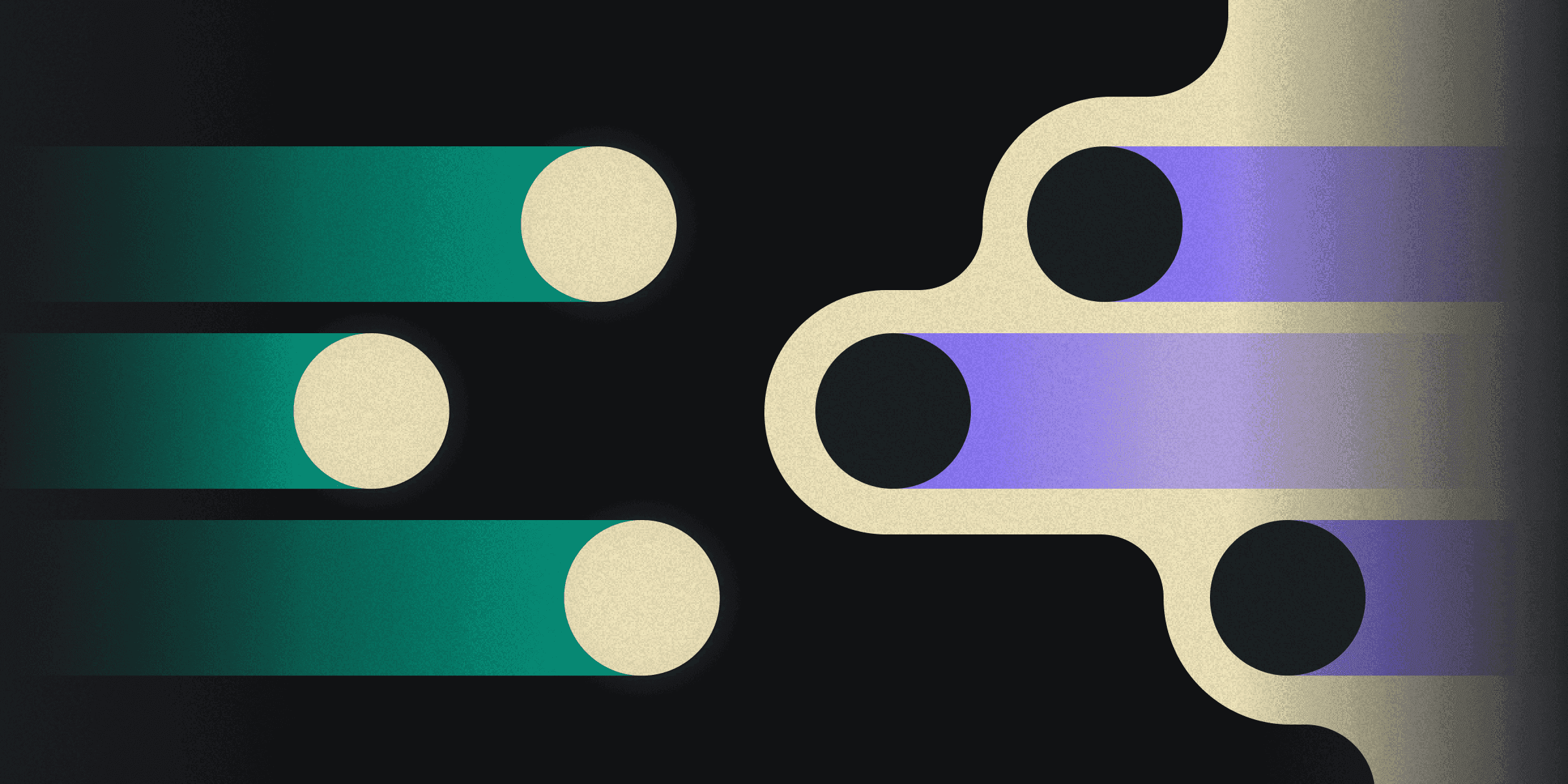
Carbon Black provides endpoint security solutions designed to protect against cyber threats. While it offers robust features, it may not be suitable for every organization. This article explores how Twingate's zero trust networking model enhances security for distributed workforces.
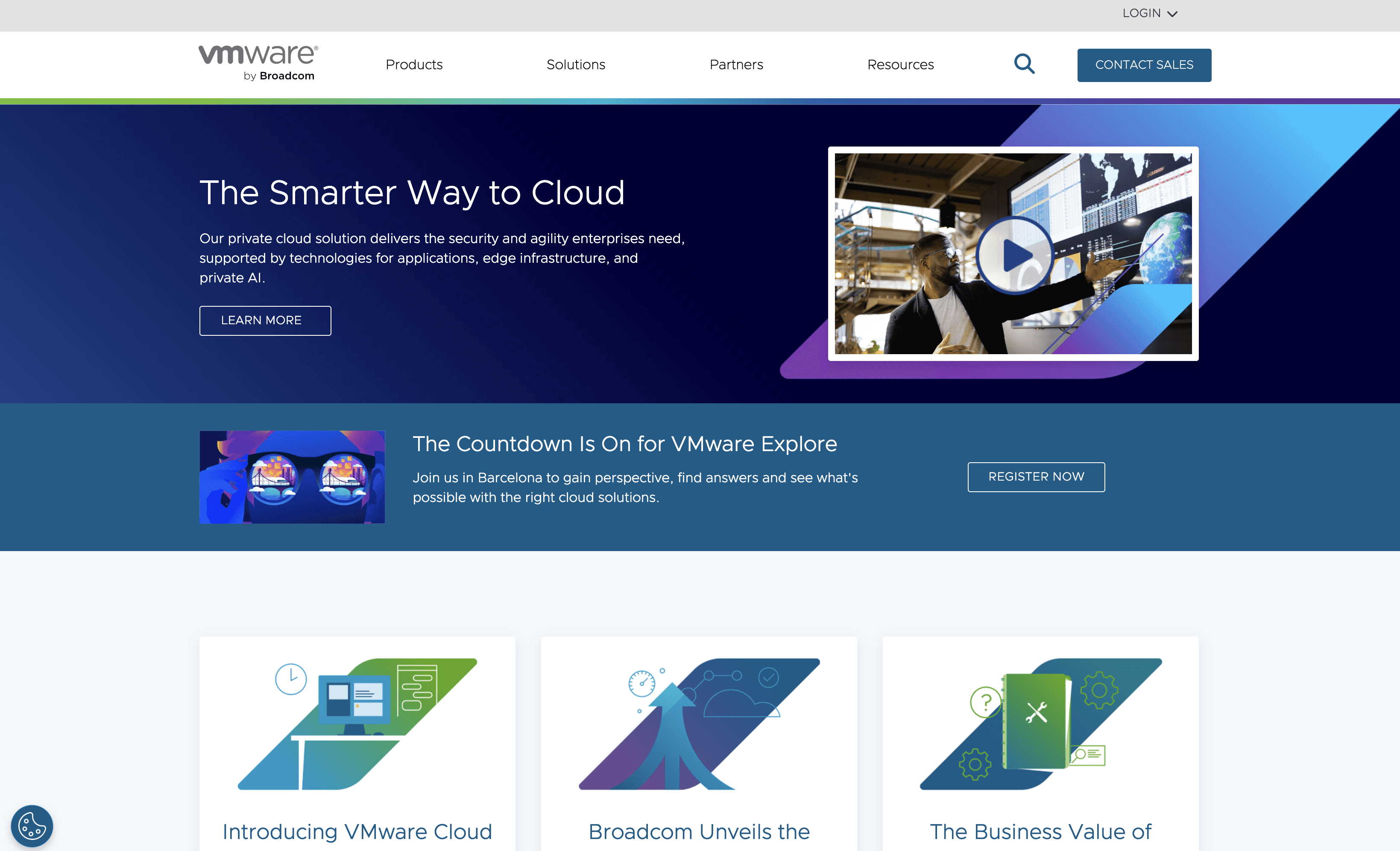
10 Alternatives to Carbon Black
1. Symantec
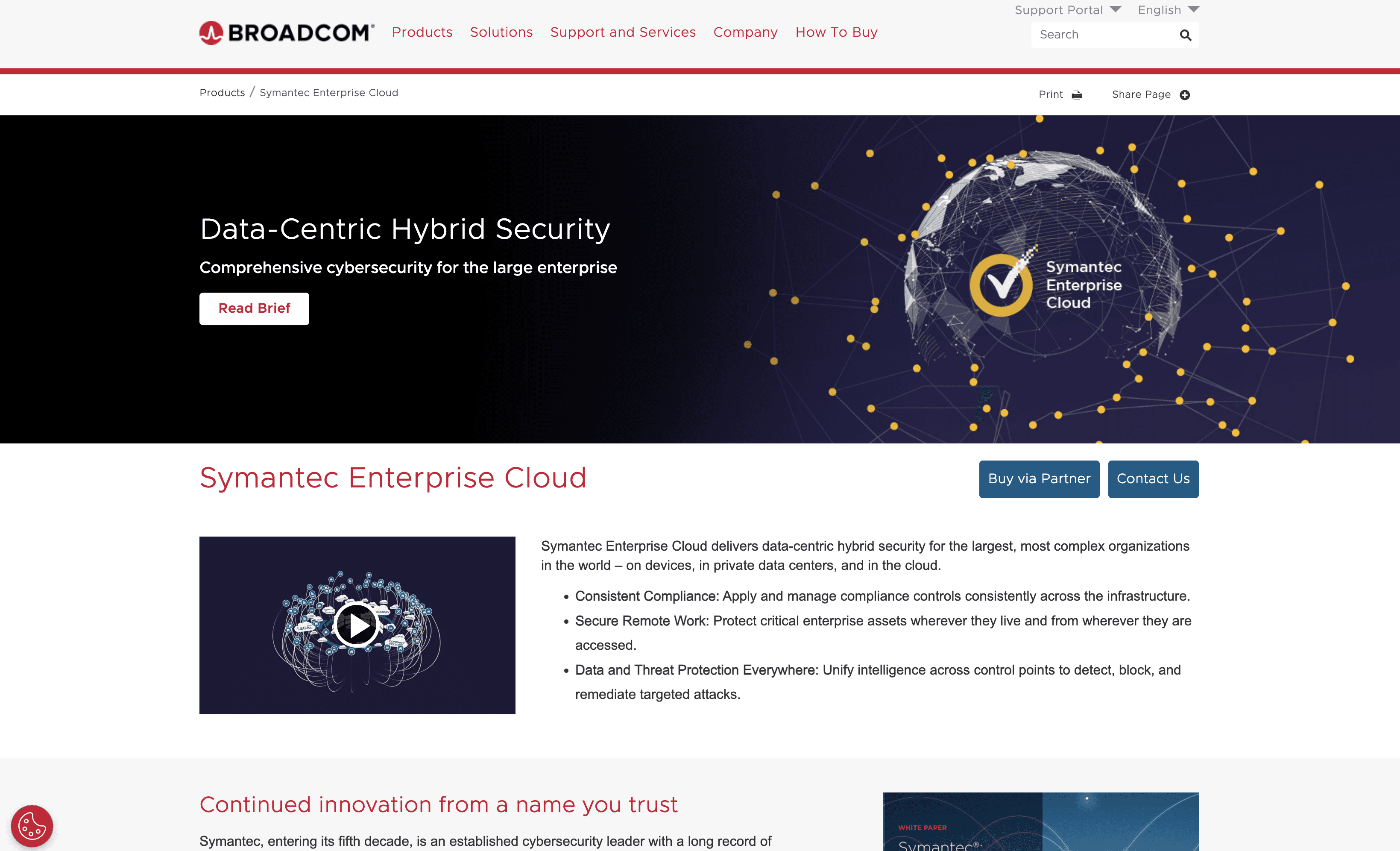
Symantec Enterprise Cloud is a comprehensive cybersecurity solution designed for large enterprises. It offers data-centric hybrid security, threat and data protection, and secure remote work capabilities. With a focus on innovation and integration, Symantec aims to provide robust protection across various platforms and environments.
Symantec Pricing
Symantec's pricing is not public. Contact their support for more info.
Symantec Reviews
Symantec has an overall rating of 4.3 out of 5 stars based on 37 reviews. Users appreciate its ease of installation and robust protection. Check out more of our reviews here!
Pros and Cons of Symantec
Pros:
Comprehensive Security: Symantec offers extensive protection across endpoint, network, information, and email security, ensuring a robust defense against diverse cyber threats.
Consistent Compliance: The platform ensures the consistent application and management of compliance controls, helping organizations meet regulatory requirements effortlessly.
Secure Remote Work: Symantec's solutions protect enterprise assets regardless of location, making it ideal for distributed workforces.
Cons:
Complexity for Small Enterprises: Tailored for large organizations, Symantec's solutions might be overwhelming for smaller enterprises with limited IT resources.
Potential Cost: The advanced security features come with a higher price tag, which could be a barrier for some organizations.
Migration Challenges: Transitioning from on-premises to cloud-based solutions can pose challenges, despite claims of seamless migration.
2. Bitdefender GravityZone Business Security
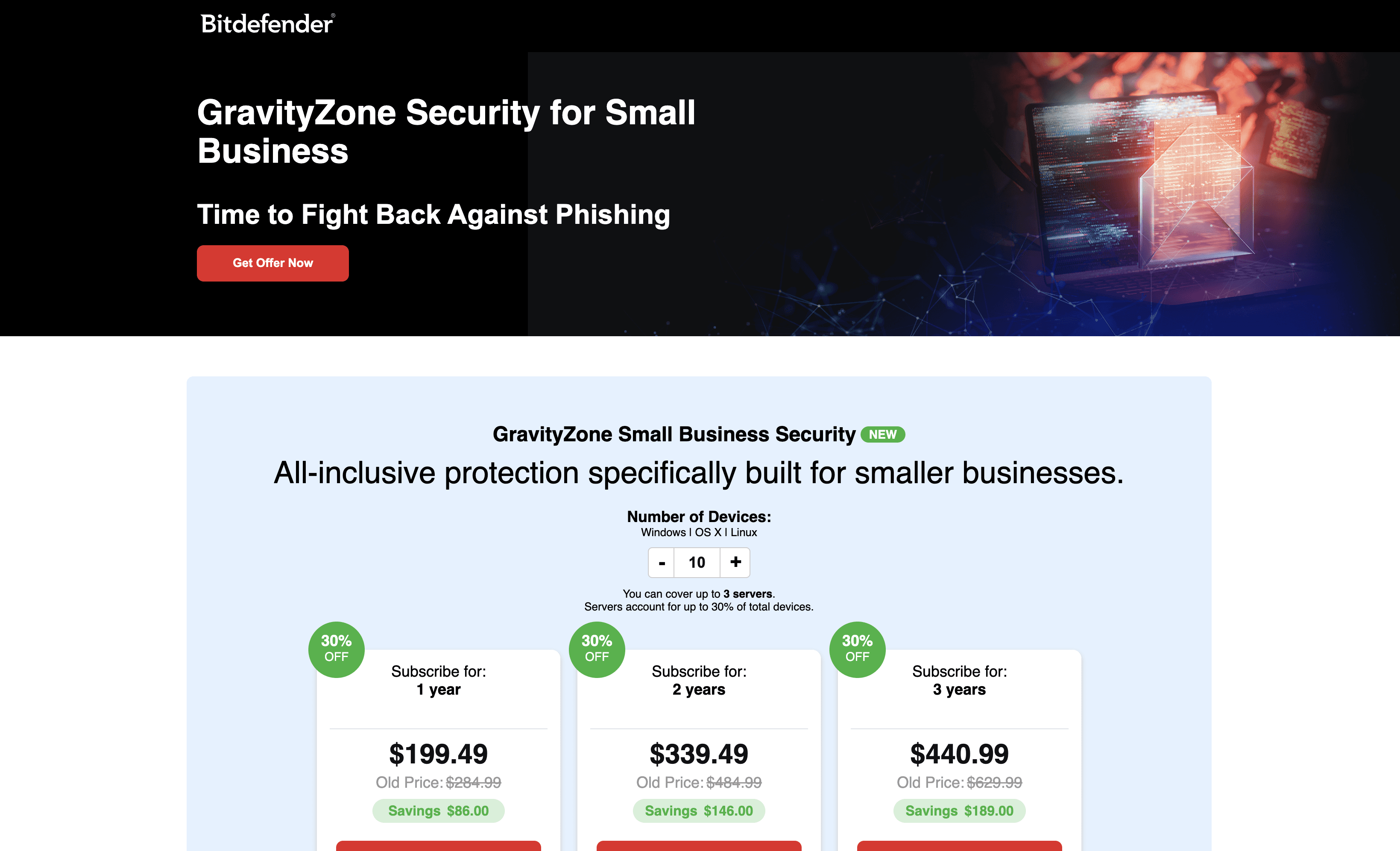
Bitdefender GravityZone Business Security is a comprehensive cybersecurity solution designed for small businesses. It offers robust protection against phishing, ransomware, and other cyber threats. With an easy-to-use interface and scalable features, it ensures businesses can focus on their core activities while staying secure.
Bitdefender GravityZone Business Security Pricing
1 Year Subscription: $199.49
2 Years Subscription: $339.49
3 Years Subscription: $440.99
Bitdefender GravityZone Business Security Reviews
Bitdefender GravityZone Business Security has an overall rating of 4.0 out of 5 stars based on 65 reviews. Users appreciate its ease of use and reliable protection. Check out more of our reviews here!
Pros and Cons ofBitdefender GravityZone Business Security
Pros:
Effective Anti-Phishing: Blocks known phishing pages and provides adaptive defense against online scams.
Ransomware Protection: Multiple layers of defense against ransomware, ensuring data safety.
Easy Management: Single console simplifies security management, ideal for small businesses.
Cons:
Complex Interface: Some users find the interface difficult to navigate and not user-friendly.
Subscription Required: Continuous protection necessitates a paid subscription after the trial period.
Limited to Small Businesses: Specifically designed for smaller enterprises, may not suit larger organizations.
3. Trend Vision One
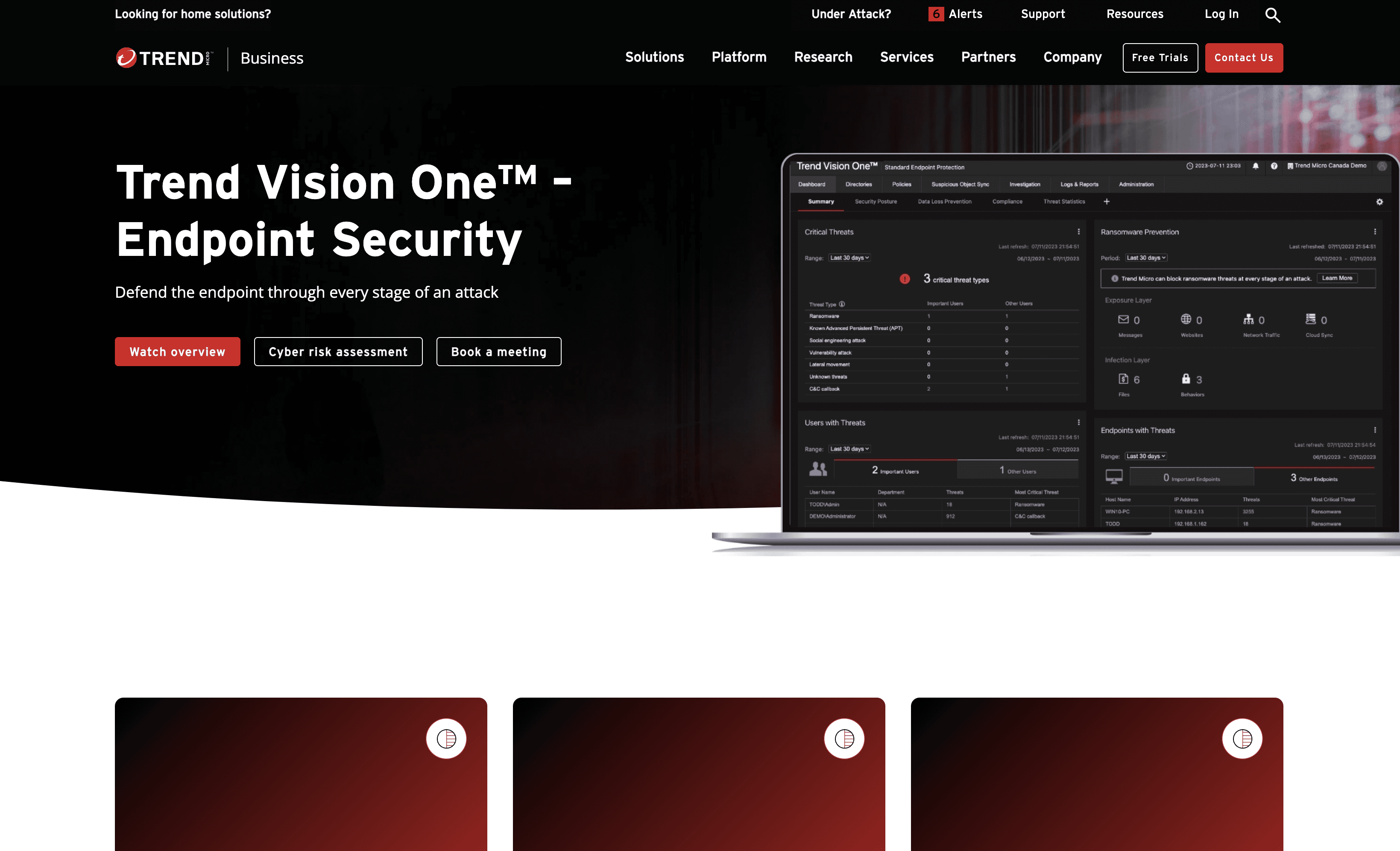
Trend Vision One is a comprehensive endpoint security solution by Trend Micro. It offers centralized visibility, response, and management across endpoints, servers, and cloud workloads. Designed to streamline IT security operations, it provides advanced threat protection and managed detection and response services for robust defense against cyber threats.
Trend Vision One Pricing
Trend Vision One's pricing is not public. Contact their support for more info.
Trend Vision One Reviews
Trend Vision One has an overall rating of 4.7 out of 5 stars based on 183 reviews. Users appreciate its comprehensive threat intelligence and seamless user experience. Check out more of our reviews here!
Pros and Cons of Trend Vision One
Pros:
Centralized Management: Consolidates endpoint, server, and workload security into a single solution, offering centralized visibility, response, and management.
Enhanced Detection and Response: Utilizes EDR and XDR for broader threat detection and response, providing better context and faster action.
Operational Efficiency: Streamlines IT security operations with comprehensive platform support, making security management more efficient.
Cons:
Complexity: The comprehensive nature of the solution might require significant expertise and resources to manage effectively.
Cost: Advanced security solutions with extensive features and managed services can be expensive, which might be a consideration for smaller organizations.
Integration Issues: Integrating with existing systems and workflows might present challenges, depending on the organization's current infrastructure.
4. Ivanti Endpoint Security
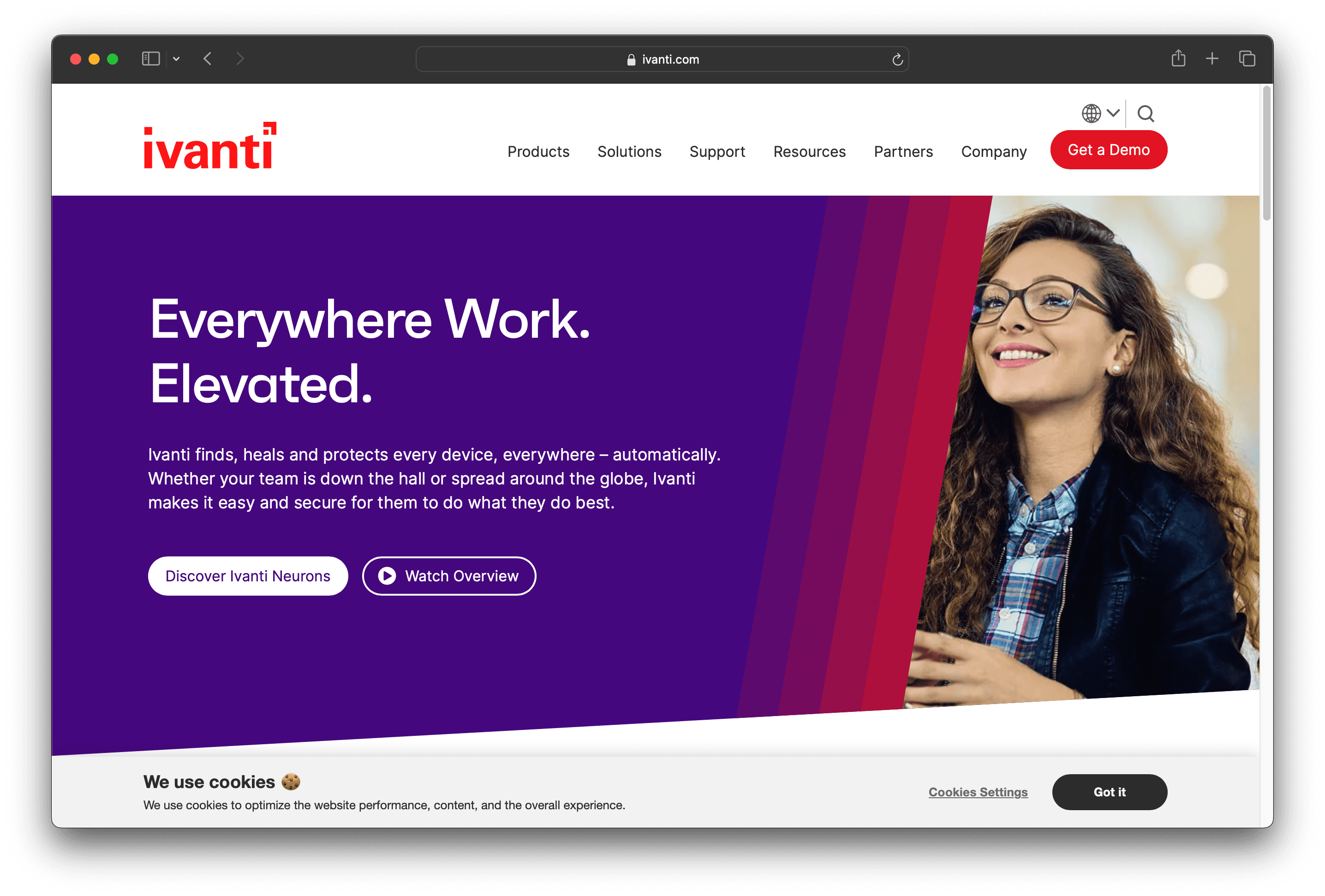
Ivanti Endpoint Security offers comprehensive protection for organizational devices and data. It focuses on blocking ransomware, phishing, and other threats, ensuring security across diverse work environments. With features like risk-based patch management and mobile threat defense, Ivanti aims to safeguard endpoints effectively.
Ivanti Endpoint Security Pricing
Ivanti Endpoint Security's pricing is not public. Contact their support for more info.
Ivanti Endpoint Security Reviews
Ivanti Endpoint Security has an overall rating of 4.3 out of 5 stars based on 17 reviews. Users appreciate its user interface and security features. Check out more of our reviews here!
Pros and Cons of Ivanti Endpoint Security
Pros:
Comprehensive Protection: Ivanti's suite safeguards against ransomware, phishing, and other threats, ensuring robust endpoint security.
Risk-based Patch Management: Prioritizes critical patches, enhancing endpoint security by addressing vulnerabilities promptly.
Mobile Threat Defense: Offers real-time, zero-day threat protection for both corporate and employee-owned mobile devices.
Cons:
Complexity of Implementation: Integrating and managing the solution can be complex, requiring significant IT resources.
Cost: Advanced security features come with a higher price, which might be a barrier for smaller organizations.
User Training: Ensuring all users are adequately trained to use the security features effectively can be challenging.
5. Hexnode UEM
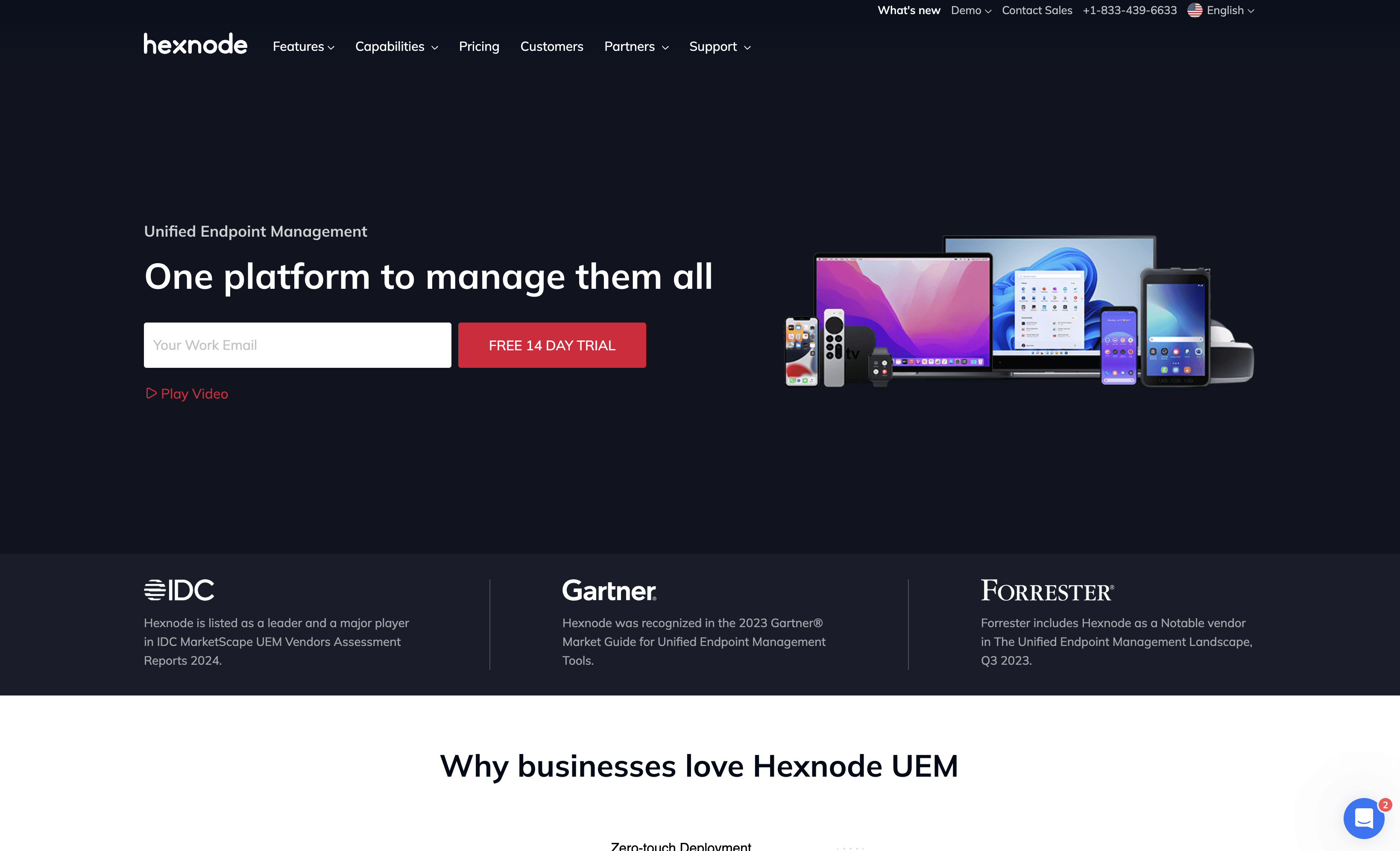
Hexnode UEM is a unified endpoint management solution designed to streamline device management across various platforms. It offers robust security features, easy deployment, and comprehensive support, making it ideal for businesses looking to manage multiple operating systems efficiently.
Hexnode UEM Pricing
Hexnode UEM's pricing is not public. Contact their support for more info.
Hexnode UEM Reviews
Hexnode UEM has an overall rating of 4.6 out of 5 stars based on 189 reviews. Users appreciate its ease of use and robust features. Check out more of our reviews here!
Pros and Cons of Hexnode UEM
Pros:
Comprehensive Device Management: Supports multiple platforms including Windows, macOS, Android, iOS, tvOS, and Fire OS.
Security Features: Offers enterprise-grade security policies, BitLocker management, password rules, and more.
Easy Migration: Facilitates easy migration of macOS devices with Hexnode Gateway.
Cons:
Complexity for New Users: The extensive range of features and capabilities might be overwhelming for new users.
Learning Curve: Requires time and effort to fully understand and utilize all functionalities.
Potential Cost: Depending on the pricing model, it might be expensive for small businesses or startups.
6. WatchGuard Endpoint Security
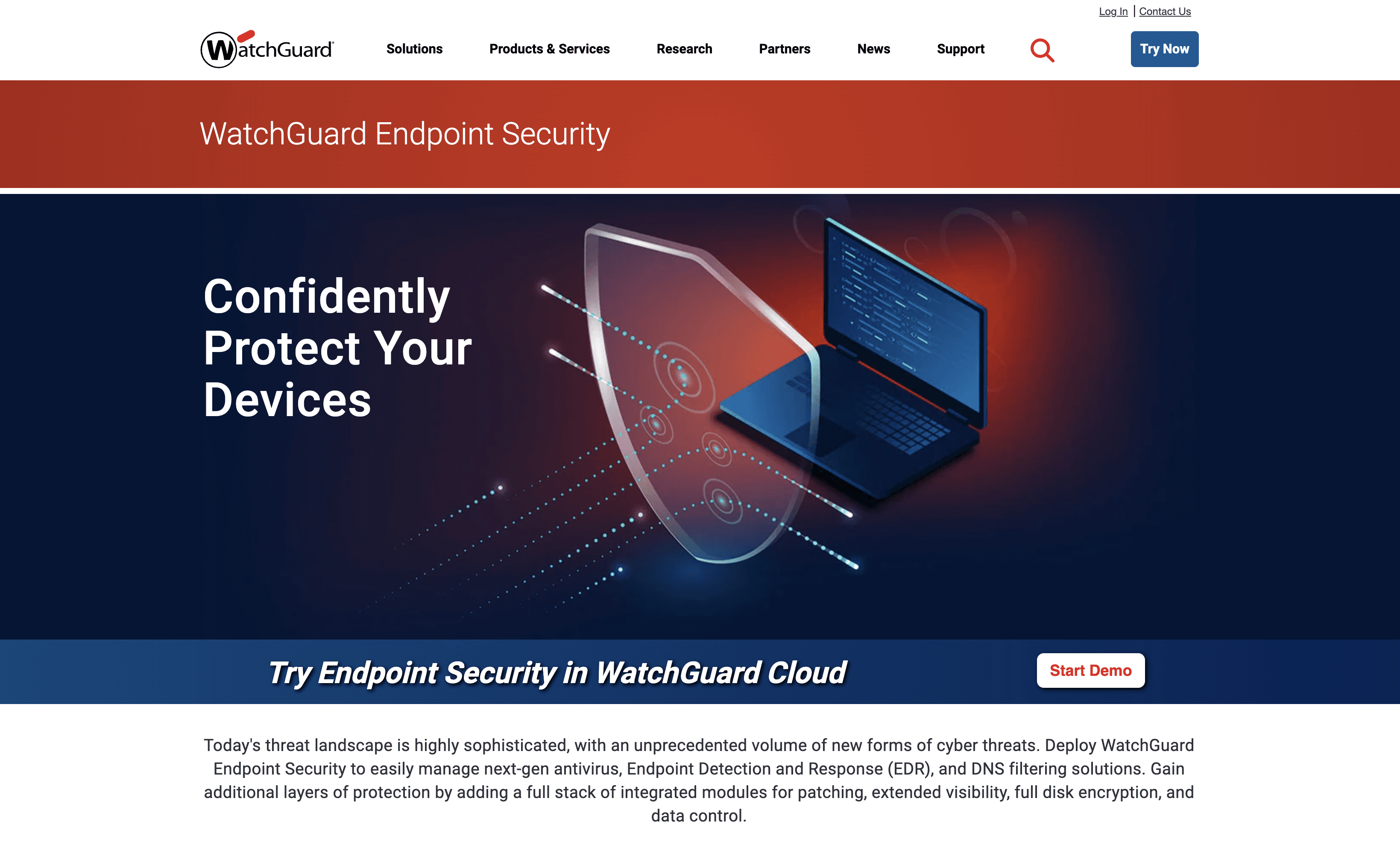
WatchGuard Endpoint Security is a comprehensive solution designed to protect devices against advanced cyber threats. It offers next-gen antivirus, Endpoint Detection and Response (EDR), and DNS filtering. With a unified security platform, it integrates network, endpoint, Wi-Fi, and identity protection, ensuring robust defense and operational efficiency.
WatchGuard Endpoint Security Pricing
WatchGuard Endpoint Security's pricing is not public. Contact their support for more info.
WatchGuard Endpoint Security Reviews
WatchGuard Endpoint Security has an overall rating of 4.4 out of 5 stars based on 115 reviews. Users appreciate its comprehensive protection and ease of use. Check out more of our reviews here!
Pros and Cons of WatchGuard Endpoint Security
Pros:
Comprehensive Protection: Integrates next-gen antivirus, EDR, and DNS filtering, ensuring robust defense against advanced threats.
Unified Security Platform: Combines network, endpoint, Wi-Fi, and identity protection for seamless security management.
Operational Automation: WatchGuard Cloud offers centralized administration, visibility, and reporting, streamlining security operations.
Cons:
Complexity for Small Businesses: Advanced features may be overwhelming for small businesses with limited IT resources.
Dependency on Cloud: Heavy reliance on cloud-based management can be a drawback for organizations with strict data residency requirements.
Learning Curve: IT teams may require time to fully utilize the platform’s advanced features and integrations.
7. F-Secure Elements
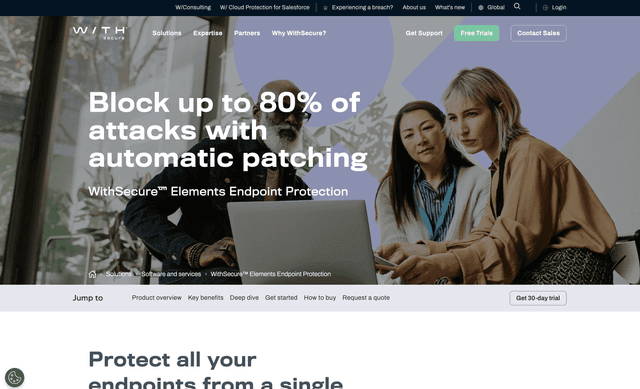
F-Secure Elements is a cloud-native, AI-powered endpoint protection solution designed to secure all endpoints, including computers, servers, and mobile devices. It offers automated patch management, web browser security, and multi-engine malware protection, ensuring comprehensive security against advanced threats and fileless attacks.
F-Secure Elements Pricing
F-Secure Elements's pricing is not public. Contact their support for more info.
F-Secure Elements Reviews
F-Secure Elements has an overall rating of 4.4 out of 5 stars based on 17 reviews. Users appreciate its easy deployment and effective threat detection. Check out more of our reviews here!
Pros and Cons of F-Secure Elements
Pros:
Automated Patch Management: Blocks up to 80% of ransomware attacks, ensuring robust endpoint security.
Web Browser Security: Provides safe browsing by blocking malicious websites and preventing phishing attacks.
Multi-engine Malware Protection: Utilizes multiple engines to detect and neutralize various types of malware effectively.
Cons:
Premium Features: Advanced features like DataGuard and Endpoint Encryption are only available in the premium version.
Complexity for Small Businesses: The extensive features might be overwhelming for small businesses without dedicated IT support.
Dependence on Cloud: Requires reliable internet connectivity for optimal performance, which might be a limitation for some organizations.
8. NinjaOne
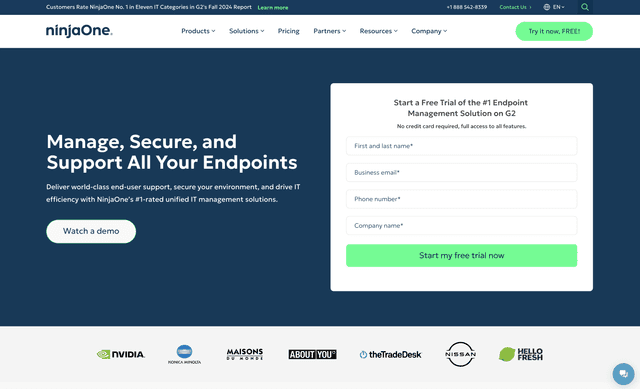
NinjaOne is an IT management solution designed to streamline endpoint management, security, and support. It offers features like remote monitoring, patch management, and backup, all within a user-friendly interface. Ideal for IT teams, NinjaOne aims to enhance efficiency and reduce complexity across various devices and platforms.
NinjaOne Pricing
NinjaOne's pricing is not public. Contact their support for more info.
NinjaOne Reviews
NinjaOne has an overall rating of 4.8 out of 5 stars based on 1,437 reviews. Users appreciate its ease of use and comprehensive features. Check out more of our reviews here!
Pros and Cons of NinjaOne
Pros:
Comprehensive Endpoint Management: Provides visibility and control over endpoints, supporting various operating systems and devices.
Automation: Automates repetitive IT tasks, freeing up IT teams for strategic tasks.
Ease of Use: Quick to deploy, easy to learn, and intuitive to use.
Cons:
Complexity for Small Teams: The comprehensive feature set might be overwhelming for smaller IT teams.
Cost: While not explicitly mentioned, the cost could be a factor for smaller organizations or those with limited budgets.
Learning Curve: Despite being easy to use, there might still be a learning curve for new users unfamiliar with IT management tools.
9. Microsoft Defender for Endpoint
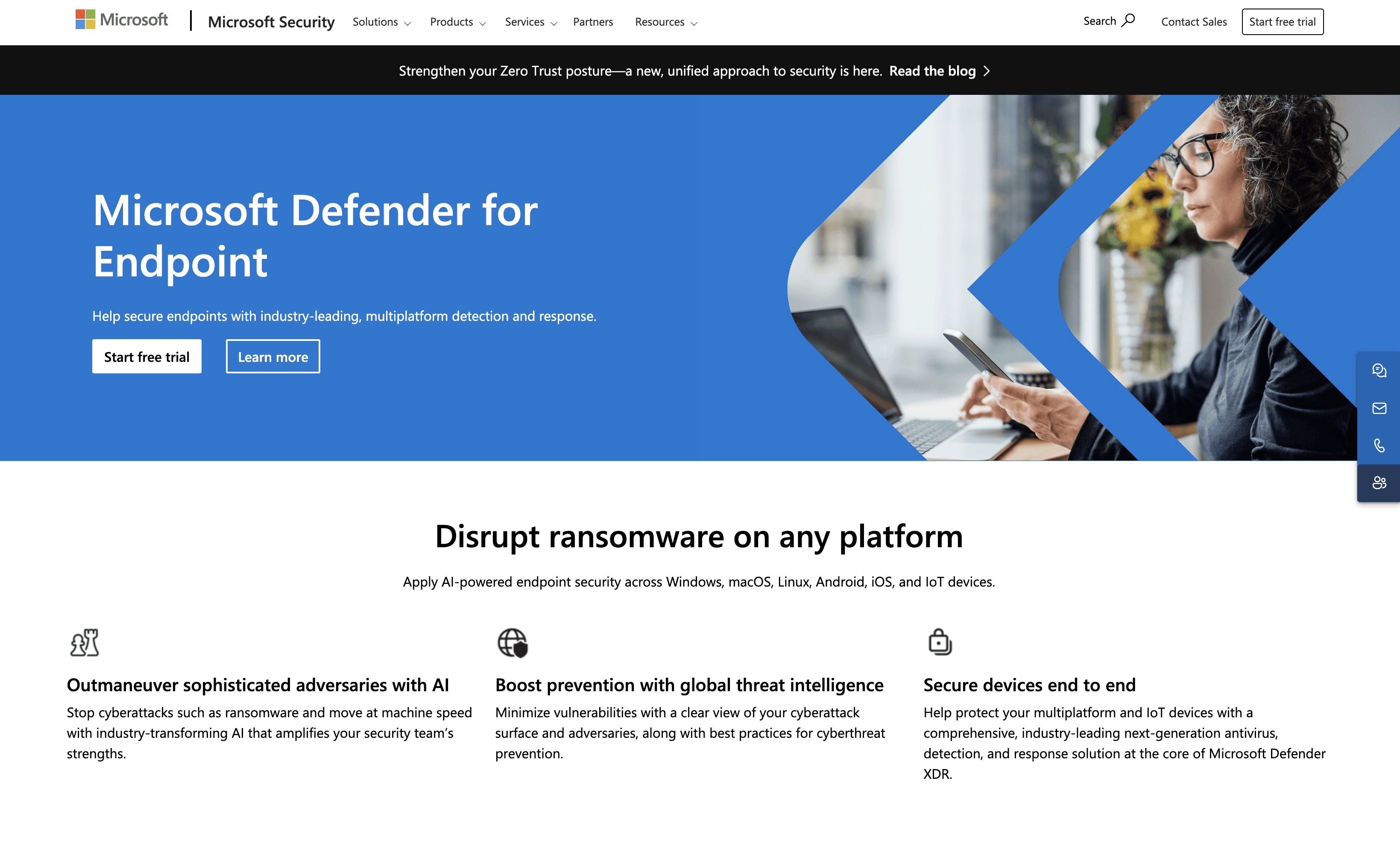
Microsoft Defender for Endpoint is a security solution designed to protect endpoints with advanced detection and response capabilities. It offers multiplatform support, automated threat disruption, and simplified management tools, making it an ideal choice for businesses seeking robust and easy-to-use endpoint security.
Microsoft Defender for Endpoint Pricing
Microsoft Defender for Endpoint's pricing is not public. Contact their support for more info.
Microsoft Defender for Endpoint Reviews
Microsoft Defender for Endpoint has an overall rating of 4.4 out of 5 stars based on 303 reviews. Users appreciate its comprehensive security features and ease of use. Check out more of our reviews here!
Pros and Cons of Microsoft Defender for Endpoint
Pros:
AI-Powered Security: Utilizes artificial intelligence to detect and disrupt sophisticated cyber threats, enhancing overall security.
Multiplatform Support: Protects a wide range of devices including Windows, macOS, Linux, Android, iOS, and IoT.
Global Threat Intelligence: Provides comprehensive threat intelligence, offering a clear view of the cyberattack surface and best practices for prevention.
Cons:
Complexity: The comprehensive nature of the product might require significant expertise to manage effectively.
Cost: Advanced features and enterprise-level capabilities might come at a higher cost, which could be a consideration for smaller businesses.
Integration Issues: Integrating with existing systems and workflows might present challenges, depending on the organization's current infrastructure.
10. Avast Endpoint Protection
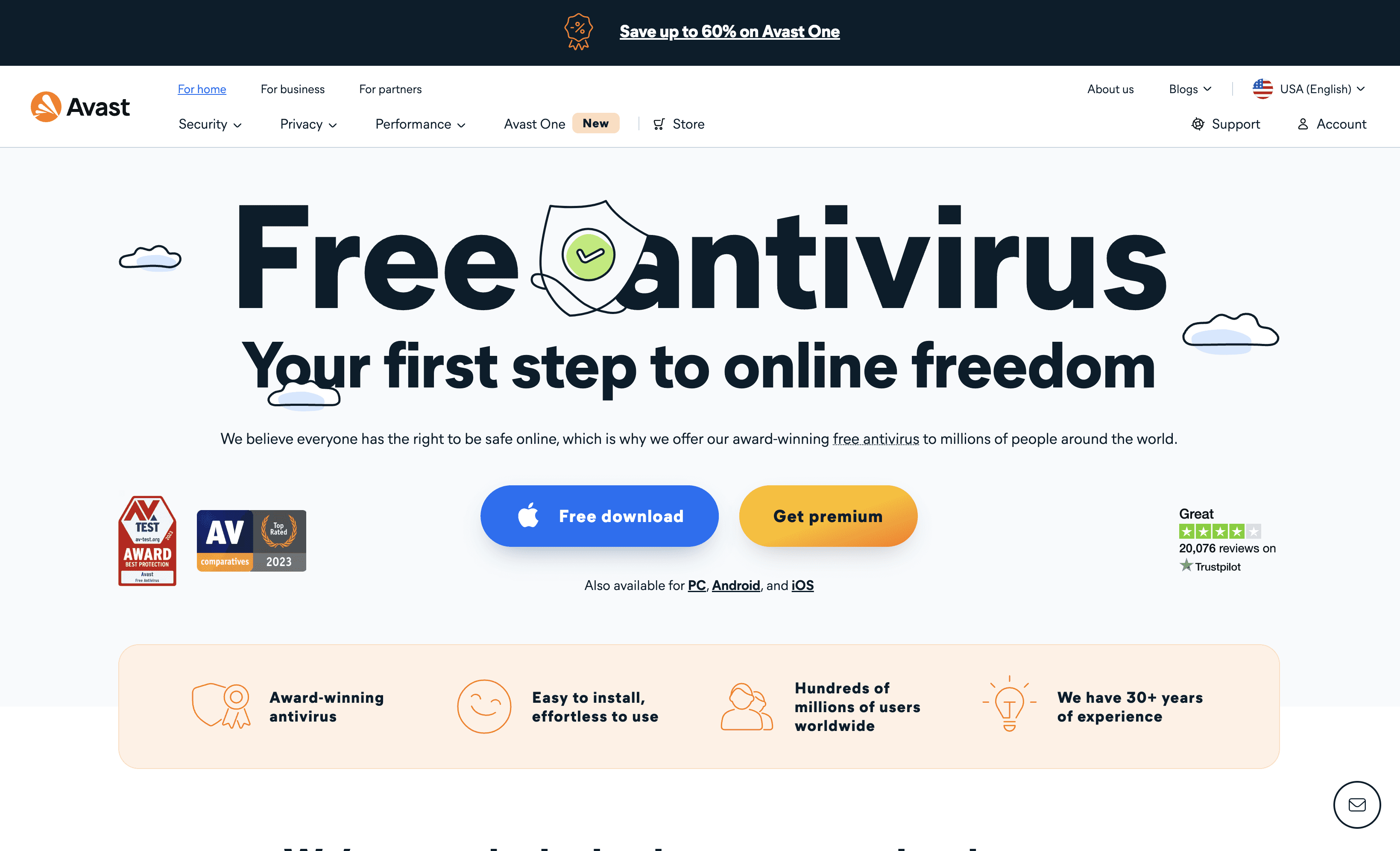
Avast Endpoint Protection is a cybersecurity solution designed to safeguard business devices from cyber threats. It offers comprehensive protection, including antivirus, ransomware defense, and web security. With an easy-to-use interface and scalable features, Avast aims to provide robust security for businesses of all sizes.
Avast Endpoint Protection Pricing
Avast Essential Business Security: $148.36 per year
Avast Premium Business Security: $187.00 per year
Avast Ultimate Business Security: $227.08 per year
Avast Endpoint Protection Reviews
Avast Endpoint Protection has an overall rating of 4.4 out of 5 stars based on 101 reviews. Users appreciate its extensive protection tools and user-friendly controls. Check out more of our reviews here!
Pros and Cons of Avast Endpoint Protection
Pros:
Ease of Use: Avast Endpoint Protection is user-friendly, making it accessible even for those with limited technical knowledge.
Comprehensive Protection: Offers robust defense against various cyber threats, including antivirus, ransomware, and web security.
Wide User Base: Trusted by millions globally, indicating a strong reputation and reliability in the cybersecurity market.
Cons:
Complex Installation: Some users report difficulties during the installation process, which can be time-consuming and frustrating.
Performance Impact: The software may slow down devices, affecting overall system performance, especially on older hardware.
Privacy Concerns: Extensive permissions and data collection required for full functionality might raise privacy issues for some users.
Looking to secure your technical infrastructure?
Twingate offers granular access controls and deployment automations to protect your VPC environment. By leveraging Zero Trust security tools, Twingate ensures that private resources and internet traffic remain secure in the modern work landscape. Try Twingate for Free today!
Rapidly implement a modern Zero Trust network that is more secure and maintainable than VPNs.
The Best 10 Alternatives to Carbon Black (+ Pricing & Reviews)
Twingate Team
•
Jul 27, 2024

Carbon Black provides endpoint security solutions designed to protect against cyber threats. While it offers robust features, it may not be suitable for every organization. This article explores how Twingate's zero trust networking model enhances security for distributed workforces.

10 Alternatives to Carbon Black
1. Symantec

Symantec Enterprise Cloud is a comprehensive cybersecurity solution designed for large enterprises. It offers data-centric hybrid security, threat and data protection, and secure remote work capabilities. With a focus on innovation and integration, Symantec aims to provide robust protection across various platforms and environments.
Symantec Pricing
Symantec's pricing is not public. Contact their support for more info.
Symantec Reviews
Symantec has an overall rating of 4.3 out of 5 stars based on 37 reviews. Users appreciate its ease of installation and robust protection. Check out more of our reviews here!
Pros and Cons of Symantec
Pros:
Comprehensive Security: Symantec offers extensive protection across endpoint, network, information, and email security, ensuring a robust defense against diverse cyber threats.
Consistent Compliance: The platform ensures the consistent application and management of compliance controls, helping organizations meet regulatory requirements effortlessly.
Secure Remote Work: Symantec's solutions protect enterprise assets regardless of location, making it ideal for distributed workforces.
Cons:
Complexity for Small Enterprises: Tailored for large organizations, Symantec's solutions might be overwhelming for smaller enterprises with limited IT resources.
Potential Cost: The advanced security features come with a higher price tag, which could be a barrier for some organizations.
Migration Challenges: Transitioning from on-premises to cloud-based solutions can pose challenges, despite claims of seamless migration.
2. Bitdefender GravityZone Business Security

Bitdefender GravityZone Business Security is a comprehensive cybersecurity solution designed for small businesses. It offers robust protection against phishing, ransomware, and other cyber threats. With an easy-to-use interface and scalable features, it ensures businesses can focus on their core activities while staying secure.
Bitdefender GravityZone Business Security Pricing
1 Year Subscription: $199.49
2 Years Subscription: $339.49
3 Years Subscription: $440.99
Bitdefender GravityZone Business Security Reviews
Bitdefender GravityZone Business Security has an overall rating of 4.0 out of 5 stars based on 65 reviews. Users appreciate its ease of use and reliable protection. Check out more of our reviews here!
Pros and Cons ofBitdefender GravityZone Business Security
Pros:
Effective Anti-Phishing: Blocks known phishing pages and provides adaptive defense against online scams.
Ransomware Protection: Multiple layers of defense against ransomware, ensuring data safety.
Easy Management: Single console simplifies security management, ideal for small businesses.
Cons:
Complex Interface: Some users find the interface difficult to navigate and not user-friendly.
Subscription Required: Continuous protection necessitates a paid subscription after the trial period.
Limited to Small Businesses: Specifically designed for smaller enterprises, may not suit larger organizations.
3. Trend Vision One

Trend Vision One is a comprehensive endpoint security solution by Trend Micro. It offers centralized visibility, response, and management across endpoints, servers, and cloud workloads. Designed to streamline IT security operations, it provides advanced threat protection and managed detection and response services for robust defense against cyber threats.
Trend Vision One Pricing
Trend Vision One's pricing is not public. Contact their support for more info.
Trend Vision One Reviews
Trend Vision One has an overall rating of 4.7 out of 5 stars based on 183 reviews. Users appreciate its comprehensive threat intelligence and seamless user experience. Check out more of our reviews here!
Pros and Cons of Trend Vision One
Pros:
Centralized Management: Consolidates endpoint, server, and workload security into a single solution, offering centralized visibility, response, and management.
Enhanced Detection and Response: Utilizes EDR and XDR for broader threat detection and response, providing better context and faster action.
Operational Efficiency: Streamlines IT security operations with comprehensive platform support, making security management more efficient.
Cons:
Complexity: The comprehensive nature of the solution might require significant expertise and resources to manage effectively.
Cost: Advanced security solutions with extensive features and managed services can be expensive, which might be a consideration for smaller organizations.
Integration Issues: Integrating with existing systems and workflows might present challenges, depending on the organization's current infrastructure.
4. Ivanti Endpoint Security

Ivanti Endpoint Security offers comprehensive protection for organizational devices and data. It focuses on blocking ransomware, phishing, and other threats, ensuring security across diverse work environments. With features like risk-based patch management and mobile threat defense, Ivanti aims to safeguard endpoints effectively.
Ivanti Endpoint Security Pricing
Ivanti Endpoint Security's pricing is not public. Contact their support for more info.
Ivanti Endpoint Security Reviews
Ivanti Endpoint Security has an overall rating of 4.3 out of 5 stars based on 17 reviews. Users appreciate its user interface and security features. Check out more of our reviews here!
Pros and Cons of Ivanti Endpoint Security
Pros:
Comprehensive Protection: Ivanti's suite safeguards against ransomware, phishing, and other threats, ensuring robust endpoint security.
Risk-based Patch Management: Prioritizes critical patches, enhancing endpoint security by addressing vulnerabilities promptly.
Mobile Threat Defense: Offers real-time, zero-day threat protection for both corporate and employee-owned mobile devices.
Cons:
Complexity of Implementation: Integrating and managing the solution can be complex, requiring significant IT resources.
Cost: Advanced security features come with a higher price, which might be a barrier for smaller organizations.
User Training: Ensuring all users are adequately trained to use the security features effectively can be challenging.
5. Hexnode UEM

Hexnode UEM is a unified endpoint management solution designed to streamline device management across various platforms. It offers robust security features, easy deployment, and comprehensive support, making it ideal for businesses looking to manage multiple operating systems efficiently.
Hexnode UEM Pricing
Hexnode UEM's pricing is not public. Contact their support for more info.
Hexnode UEM Reviews
Hexnode UEM has an overall rating of 4.6 out of 5 stars based on 189 reviews. Users appreciate its ease of use and robust features. Check out more of our reviews here!
Pros and Cons of Hexnode UEM
Pros:
Comprehensive Device Management: Supports multiple platforms including Windows, macOS, Android, iOS, tvOS, and Fire OS.
Security Features: Offers enterprise-grade security policies, BitLocker management, password rules, and more.
Easy Migration: Facilitates easy migration of macOS devices with Hexnode Gateway.
Cons:
Complexity for New Users: The extensive range of features and capabilities might be overwhelming for new users.
Learning Curve: Requires time and effort to fully understand and utilize all functionalities.
Potential Cost: Depending on the pricing model, it might be expensive for small businesses or startups.
6. WatchGuard Endpoint Security

WatchGuard Endpoint Security is a comprehensive solution designed to protect devices against advanced cyber threats. It offers next-gen antivirus, Endpoint Detection and Response (EDR), and DNS filtering. With a unified security platform, it integrates network, endpoint, Wi-Fi, and identity protection, ensuring robust defense and operational efficiency.
WatchGuard Endpoint Security Pricing
WatchGuard Endpoint Security's pricing is not public. Contact their support for more info.
WatchGuard Endpoint Security Reviews
WatchGuard Endpoint Security has an overall rating of 4.4 out of 5 stars based on 115 reviews. Users appreciate its comprehensive protection and ease of use. Check out more of our reviews here!
Pros and Cons of WatchGuard Endpoint Security
Pros:
Comprehensive Protection: Integrates next-gen antivirus, EDR, and DNS filtering, ensuring robust defense against advanced threats.
Unified Security Platform: Combines network, endpoint, Wi-Fi, and identity protection for seamless security management.
Operational Automation: WatchGuard Cloud offers centralized administration, visibility, and reporting, streamlining security operations.
Cons:
Complexity for Small Businesses: Advanced features may be overwhelming for small businesses with limited IT resources.
Dependency on Cloud: Heavy reliance on cloud-based management can be a drawback for organizations with strict data residency requirements.
Learning Curve: IT teams may require time to fully utilize the platform’s advanced features and integrations.
7. F-Secure Elements

F-Secure Elements is a cloud-native, AI-powered endpoint protection solution designed to secure all endpoints, including computers, servers, and mobile devices. It offers automated patch management, web browser security, and multi-engine malware protection, ensuring comprehensive security against advanced threats and fileless attacks.
F-Secure Elements Pricing
F-Secure Elements's pricing is not public. Contact their support for more info.
F-Secure Elements Reviews
F-Secure Elements has an overall rating of 4.4 out of 5 stars based on 17 reviews. Users appreciate its easy deployment and effective threat detection. Check out more of our reviews here!
Pros and Cons of F-Secure Elements
Pros:
Automated Patch Management: Blocks up to 80% of ransomware attacks, ensuring robust endpoint security.
Web Browser Security: Provides safe browsing by blocking malicious websites and preventing phishing attacks.
Multi-engine Malware Protection: Utilizes multiple engines to detect and neutralize various types of malware effectively.
Cons:
Premium Features: Advanced features like DataGuard and Endpoint Encryption are only available in the premium version.
Complexity for Small Businesses: The extensive features might be overwhelming for small businesses without dedicated IT support.
Dependence on Cloud: Requires reliable internet connectivity for optimal performance, which might be a limitation for some organizations.
8. NinjaOne

NinjaOne is an IT management solution designed to streamline endpoint management, security, and support. It offers features like remote monitoring, patch management, and backup, all within a user-friendly interface. Ideal for IT teams, NinjaOne aims to enhance efficiency and reduce complexity across various devices and platforms.
NinjaOne Pricing
NinjaOne's pricing is not public. Contact their support for more info.
NinjaOne Reviews
NinjaOne has an overall rating of 4.8 out of 5 stars based on 1,437 reviews. Users appreciate its ease of use and comprehensive features. Check out more of our reviews here!
Pros and Cons of NinjaOne
Pros:
Comprehensive Endpoint Management: Provides visibility and control over endpoints, supporting various operating systems and devices.
Automation: Automates repetitive IT tasks, freeing up IT teams for strategic tasks.
Ease of Use: Quick to deploy, easy to learn, and intuitive to use.
Cons:
Complexity for Small Teams: The comprehensive feature set might be overwhelming for smaller IT teams.
Cost: While not explicitly mentioned, the cost could be a factor for smaller organizations or those with limited budgets.
Learning Curve: Despite being easy to use, there might still be a learning curve for new users unfamiliar with IT management tools.
9. Microsoft Defender for Endpoint

Microsoft Defender for Endpoint is a security solution designed to protect endpoints with advanced detection and response capabilities. It offers multiplatform support, automated threat disruption, and simplified management tools, making it an ideal choice for businesses seeking robust and easy-to-use endpoint security.
Microsoft Defender for Endpoint Pricing
Microsoft Defender for Endpoint's pricing is not public. Contact their support for more info.
Microsoft Defender for Endpoint Reviews
Microsoft Defender for Endpoint has an overall rating of 4.4 out of 5 stars based on 303 reviews. Users appreciate its comprehensive security features and ease of use. Check out more of our reviews here!
Pros and Cons of Microsoft Defender for Endpoint
Pros:
AI-Powered Security: Utilizes artificial intelligence to detect and disrupt sophisticated cyber threats, enhancing overall security.
Multiplatform Support: Protects a wide range of devices including Windows, macOS, Linux, Android, iOS, and IoT.
Global Threat Intelligence: Provides comprehensive threat intelligence, offering a clear view of the cyberattack surface and best practices for prevention.
Cons:
Complexity: The comprehensive nature of the product might require significant expertise to manage effectively.
Cost: Advanced features and enterprise-level capabilities might come at a higher cost, which could be a consideration for smaller businesses.
Integration Issues: Integrating with existing systems and workflows might present challenges, depending on the organization's current infrastructure.
10. Avast Endpoint Protection

Avast Endpoint Protection is a cybersecurity solution designed to safeguard business devices from cyber threats. It offers comprehensive protection, including antivirus, ransomware defense, and web security. With an easy-to-use interface and scalable features, Avast aims to provide robust security for businesses of all sizes.
Avast Endpoint Protection Pricing
Avast Essential Business Security: $148.36 per year
Avast Premium Business Security: $187.00 per year
Avast Ultimate Business Security: $227.08 per year
Avast Endpoint Protection Reviews
Avast Endpoint Protection has an overall rating of 4.4 out of 5 stars based on 101 reviews. Users appreciate its extensive protection tools and user-friendly controls. Check out more of our reviews here!
Pros and Cons of Avast Endpoint Protection
Pros:
Ease of Use: Avast Endpoint Protection is user-friendly, making it accessible even for those with limited technical knowledge.
Comprehensive Protection: Offers robust defense against various cyber threats, including antivirus, ransomware, and web security.
Wide User Base: Trusted by millions globally, indicating a strong reputation and reliability in the cybersecurity market.
Cons:
Complex Installation: Some users report difficulties during the installation process, which can be time-consuming and frustrating.
Performance Impact: The software may slow down devices, affecting overall system performance, especially on older hardware.
Privacy Concerns: Extensive permissions and data collection required for full functionality might raise privacy issues for some users.
Looking to secure your technical infrastructure?
Twingate offers granular access controls and deployment automations to protect your VPC environment. By leveraging Zero Trust security tools, Twingate ensures that private resources and internet traffic remain secure in the modern work landscape. Try Twingate for Free today!
Rapidly implement a modern Zero Trust network that is more secure and maintainable than VPNs.
The Best 10 Alternatives to Carbon Black (+ Pricing & Reviews)
Twingate Team
•
Jul 27, 2024

Carbon Black provides endpoint security solutions designed to protect against cyber threats. While it offers robust features, it may not be suitable for every organization. This article explores how Twingate's zero trust networking model enhances security for distributed workforces.

10 Alternatives to Carbon Black
1. Symantec

Symantec Enterprise Cloud is a comprehensive cybersecurity solution designed for large enterprises. It offers data-centric hybrid security, threat and data protection, and secure remote work capabilities. With a focus on innovation and integration, Symantec aims to provide robust protection across various platforms and environments.
Symantec Pricing
Symantec's pricing is not public. Contact their support for more info.
Symantec Reviews
Symantec has an overall rating of 4.3 out of 5 stars based on 37 reviews. Users appreciate its ease of installation and robust protection. Check out more of our reviews here!
Pros and Cons of Symantec
Pros:
Comprehensive Security: Symantec offers extensive protection across endpoint, network, information, and email security, ensuring a robust defense against diverse cyber threats.
Consistent Compliance: The platform ensures the consistent application and management of compliance controls, helping organizations meet regulatory requirements effortlessly.
Secure Remote Work: Symantec's solutions protect enterprise assets regardless of location, making it ideal for distributed workforces.
Cons:
Complexity for Small Enterprises: Tailored for large organizations, Symantec's solutions might be overwhelming for smaller enterprises with limited IT resources.
Potential Cost: The advanced security features come with a higher price tag, which could be a barrier for some organizations.
Migration Challenges: Transitioning from on-premises to cloud-based solutions can pose challenges, despite claims of seamless migration.
2. Bitdefender GravityZone Business Security

Bitdefender GravityZone Business Security is a comprehensive cybersecurity solution designed for small businesses. It offers robust protection against phishing, ransomware, and other cyber threats. With an easy-to-use interface and scalable features, it ensures businesses can focus on their core activities while staying secure.
Bitdefender GravityZone Business Security Pricing
1 Year Subscription: $199.49
2 Years Subscription: $339.49
3 Years Subscription: $440.99
Bitdefender GravityZone Business Security Reviews
Bitdefender GravityZone Business Security has an overall rating of 4.0 out of 5 stars based on 65 reviews. Users appreciate its ease of use and reliable protection. Check out more of our reviews here!
Pros and Cons ofBitdefender GravityZone Business Security
Pros:
Effective Anti-Phishing: Blocks known phishing pages and provides adaptive defense against online scams.
Ransomware Protection: Multiple layers of defense against ransomware, ensuring data safety.
Easy Management: Single console simplifies security management, ideal for small businesses.
Cons:
Complex Interface: Some users find the interface difficult to navigate and not user-friendly.
Subscription Required: Continuous protection necessitates a paid subscription after the trial period.
Limited to Small Businesses: Specifically designed for smaller enterprises, may not suit larger organizations.
3. Trend Vision One

Trend Vision One is a comprehensive endpoint security solution by Trend Micro. It offers centralized visibility, response, and management across endpoints, servers, and cloud workloads. Designed to streamline IT security operations, it provides advanced threat protection and managed detection and response services for robust defense against cyber threats.
Trend Vision One Pricing
Trend Vision One's pricing is not public. Contact their support for more info.
Trend Vision One Reviews
Trend Vision One has an overall rating of 4.7 out of 5 stars based on 183 reviews. Users appreciate its comprehensive threat intelligence and seamless user experience. Check out more of our reviews here!
Pros and Cons of Trend Vision One
Pros:
Centralized Management: Consolidates endpoint, server, and workload security into a single solution, offering centralized visibility, response, and management.
Enhanced Detection and Response: Utilizes EDR and XDR for broader threat detection and response, providing better context and faster action.
Operational Efficiency: Streamlines IT security operations with comprehensive platform support, making security management more efficient.
Cons:
Complexity: The comprehensive nature of the solution might require significant expertise and resources to manage effectively.
Cost: Advanced security solutions with extensive features and managed services can be expensive, which might be a consideration for smaller organizations.
Integration Issues: Integrating with existing systems and workflows might present challenges, depending on the organization's current infrastructure.
4. Ivanti Endpoint Security

Ivanti Endpoint Security offers comprehensive protection for organizational devices and data. It focuses on blocking ransomware, phishing, and other threats, ensuring security across diverse work environments. With features like risk-based patch management and mobile threat defense, Ivanti aims to safeguard endpoints effectively.
Ivanti Endpoint Security Pricing
Ivanti Endpoint Security's pricing is not public. Contact their support for more info.
Ivanti Endpoint Security Reviews
Ivanti Endpoint Security has an overall rating of 4.3 out of 5 stars based on 17 reviews. Users appreciate its user interface and security features. Check out more of our reviews here!
Pros and Cons of Ivanti Endpoint Security
Pros:
Comprehensive Protection: Ivanti's suite safeguards against ransomware, phishing, and other threats, ensuring robust endpoint security.
Risk-based Patch Management: Prioritizes critical patches, enhancing endpoint security by addressing vulnerabilities promptly.
Mobile Threat Defense: Offers real-time, zero-day threat protection for both corporate and employee-owned mobile devices.
Cons:
Complexity of Implementation: Integrating and managing the solution can be complex, requiring significant IT resources.
Cost: Advanced security features come with a higher price, which might be a barrier for smaller organizations.
User Training: Ensuring all users are adequately trained to use the security features effectively can be challenging.
5. Hexnode UEM

Hexnode UEM is a unified endpoint management solution designed to streamline device management across various platforms. It offers robust security features, easy deployment, and comprehensive support, making it ideal for businesses looking to manage multiple operating systems efficiently.
Hexnode UEM Pricing
Hexnode UEM's pricing is not public. Contact their support for more info.
Hexnode UEM Reviews
Hexnode UEM has an overall rating of 4.6 out of 5 stars based on 189 reviews. Users appreciate its ease of use and robust features. Check out more of our reviews here!
Pros and Cons of Hexnode UEM
Pros:
Comprehensive Device Management: Supports multiple platforms including Windows, macOS, Android, iOS, tvOS, and Fire OS.
Security Features: Offers enterprise-grade security policies, BitLocker management, password rules, and more.
Easy Migration: Facilitates easy migration of macOS devices with Hexnode Gateway.
Cons:
Complexity for New Users: The extensive range of features and capabilities might be overwhelming for new users.
Learning Curve: Requires time and effort to fully understand and utilize all functionalities.
Potential Cost: Depending on the pricing model, it might be expensive for small businesses or startups.
6. WatchGuard Endpoint Security

WatchGuard Endpoint Security is a comprehensive solution designed to protect devices against advanced cyber threats. It offers next-gen antivirus, Endpoint Detection and Response (EDR), and DNS filtering. With a unified security platform, it integrates network, endpoint, Wi-Fi, and identity protection, ensuring robust defense and operational efficiency.
WatchGuard Endpoint Security Pricing
WatchGuard Endpoint Security's pricing is not public. Contact their support for more info.
WatchGuard Endpoint Security Reviews
WatchGuard Endpoint Security has an overall rating of 4.4 out of 5 stars based on 115 reviews. Users appreciate its comprehensive protection and ease of use. Check out more of our reviews here!
Pros and Cons of WatchGuard Endpoint Security
Pros:
Comprehensive Protection: Integrates next-gen antivirus, EDR, and DNS filtering, ensuring robust defense against advanced threats.
Unified Security Platform: Combines network, endpoint, Wi-Fi, and identity protection for seamless security management.
Operational Automation: WatchGuard Cloud offers centralized administration, visibility, and reporting, streamlining security operations.
Cons:
Complexity for Small Businesses: Advanced features may be overwhelming for small businesses with limited IT resources.
Dependency on Cloud: Heavy reliance on cloud-based management can be a drawback for organizations with strict data residency requirements.
Learning Curve: IT teams may require time to fully utilize the platform’s advanced features and integrations.
7. F-Secure Elements

F-Secure Elements is a cloud-native, AI-powered endpoint protection solution designed to secure all endpoints, including computers, servers, and mobile devices. It offers automated patch management, web browser security, and multi-engine malware protection, ensuring comprehensive security against advanced threats and fileless attacks.
F-Secure Elements Pricing
F-Secure Elements's pricing is not public. Contact their support for more info.
F-Secure Elements Reviews
F-Secure Elements has an overall rating of 4.4 out of 5 stars based on 17 reviews. Users appreciate its easy deployment and effective threat detection. Check out more of our reviews here!
Pros and Cons of F-Secure Elements
Pros:
Automated Patch Management: Blocks up to 80% of ransomware attacks, ensuring robust endpoint security.
Web Browser Security: Provides safe browsing by blocking malicious websites and preventing phishing attacks.
Multi-engine Malware Protection: Utilizes multiple engines to detect and neutralize various types of malware effectively.
Cons:
Premium Features: Advanced features like DataGuard and Endpoint Encryption are only available in the premium version.
Complexity for Small Businesses: The extensive features might be overwhelming for small businesses without dedicated IT support.
Dependence on Cloud: Requires reliable internet connectivity for optimal performance, which might be a limitation for some organizations.
8. NinjaOne

NinjaOne is an IT management solution designed to streamline endpoint management, security, and support. It offers features like remote monitoring, patch management, and backup, all within a user-friendly interface. Ideal for IT teams, NinjaOne aims to enhance efficiency and reduce complexity across various devices and platforms.
NinjaOne Pricing
NinjaOne's pricing is not public. Contact their support for more info.
NinjaOne Reviews
NinjaOne has an overall rating of 4.8 out of 5 stars based on 1,437 reviews. Users appreciate its ease of use and comprehensive features. Check out more of our reviews here!
Pros and Cons of NinjaOne
Pros:
Comprehensive Endpoint Management: Provides visibility and control over endpoints, supporting various operating systems and devices.
Automation: Automates repetitive IT tasks, freeing up IT teams for strategic tasks.
Ease of Use: Quick to deploy, easy to learn, and intuitive to use.
Cons:
Complexity for Small Teams: The comprehensive feature set might be overwhelming for smaller IT teams.
Cost: While not explicitly mentioned, the cost could be a factor for smaller organizations or those with limited budgets.
Learning Curve: Despite being easy to use, there might still be a learning curve for new users unfamiliar with IT management tools.
9. Microsoft Defender for Endpoint

Microsoft Defender for Endpoint is a security solution designed to protect endpoints with advanced detection and response capabilities. It offers multiplatform support, automated threat disruption, and simplified management tools, making it an ideal choice for businesses seeking robust and easy-to-use endpoint security.
Microsoft Defender for Endpoint Pricing
Microsoft Defender for Endpoint's pricing is not public. Contact their support for more info.
Microsoft Defender for Endpoint Reviews
Microsoft Defender for Endpoint has an overall rating of 4.4 out of 5 stars based on 303 reviews. Users appreciate its comprehensive security features and ease of use. Check out more of our reviews here!
Pros and Cons of Microsoft Defender for Endpoint
Pros:
AI-Powered Security: Utilizes artificial intelligence to detect and disrupt sophisticated cyber threats, enhancing overall security.
Multiplatform Support: Protects a wide range of devices including Windows, macOS, Linux, Android, iOS, and IoT.
Global Threat Intelligence: Provides comprehensive threat intelligence, offering a clear view of the cyberattack surface and best practices for prevention.
Cons:
Complexity: The comprehensive nature of the product might require significant expertise to manage effectively.
Cost: Advanced features and enterprise-level capabilities might come at a higher cost, which could be a consideration for smaller businesses.
Integration Issues: Integrating with existing systems and workflows might present challenges, depending on the organization's current infrastructure.
10. Avast Endpoint Protection

Avast Endpoint Protection is a cybersecurity solution designed to safeguard business devices from cyber threats. It offers comprehensive protection, including antivirus, ransomware defense, and web security. With an easy-to-use interface and scalable features, Avast aims to provide robust security for businesses of all sizes.
Avast Endpoint Protection Pricing
Avast Essential Business Security: $148.36 per year
Avast Premium Business Security: $187.00 per year
Avast Ultimate Business Security: $227.08 per year
Avast Endpoint Protection Reviews
Avast Endpoint Protection has an overall rating of 4.4 out of 5 stars based on 101 reviews. Users appreciate its extensive protection tools and user-friendly controls. Check out more of our reviews here!
Pros and Cons of Avast Endpoint Protection
Pros:
Ease of Use: Avast Endpoint Protection is user-friendly, making it accessible even for those with limited technical knowledge.
Comprehensive Protection: Offers robust defense against various cyber threats, including antivirus, ransomware, and web security.
Wide User Base: Trusted by millions globally, indicating a strong reputation and reliability in the cybersecurity market.
Cons:
Complex Installation: Some users report difficulties during the installation process, which can be time-consuming and frustrating.
Performance Impact: The software may slow down devices, affecting overall system performance, especially on older hardware.
Privacy Concerns: Extensive permissions and data collection required for full functionality might raise privacy issues for some users.
Looking to secure your technical infrastructure?
Twingate offers granular access controls and deployment automations to protect your VPC environment. By leveraging Zero Trust security tools, Twingate ensures that private resources and internet traffic remain secure in the modern work landscape. Try Twingate for Free today!
Solutions
Solutions
The VPN replacement your workforce will love.
Solutions